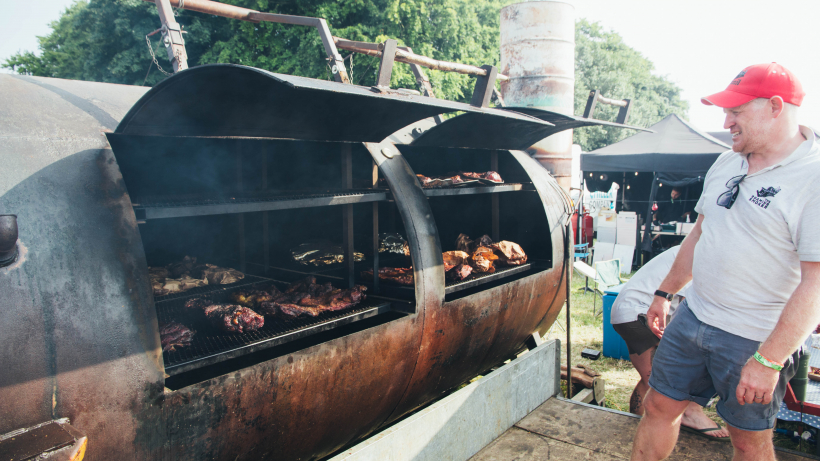The Roaming Smoker
What do you get if you combine an old diesel tank, a love of BBQ and a commitment to sustainability? Meet the Roaming Smoker, one of the latest additions to Kingsclere Estates' community of independent, circular-economy start-ups.
"What I’m hoping to show is that you can make a decent return on something which is genuinely local and really thinking about how sustainably you can make a product."

The brainchild of passionate foodie and former aerospace sustainability strategist Chris Saunders, The Roaming Smoker is a mobile smoking and roasting device made from reclaimed and upcycled materials. Inspired by the culture and principles of American brisket BBQ-ing, Chris worked with a local welder to create something bespoke that could turn low-value cuts of meat from old dairy cows into a desirable, high-end product.
Operating like a street food van – but with more theatre to the process – he's been road testing the machine at events and festivals across the land. And if the finger-licking compliments, queues round the block and repeat customers are anything to go by, it seems the British public do have a taste for more unusual cuts of meat. If they’re slowly smoked, BBQed and served with a portion of coleslaw (including British grown cabbage, carrot, onion, cider vinegar, honey and rapeseed oil), British grown quinoa and a dollop of tangy mustard, of course.
The reimagining and utilising of by-products from farming systems – in this case dairy cows from The Roaming Dairy – is at the heart of the Pitch Up! circular economy philosophy.
"I don’t have any background in farming," says founder Chris Saunders. "I wasn’t even sure you could eat old dairy cows. I learned all that by talking to Ollie Chedgey from The Roaming Dairy, a mobile milking parlour also based at Kingsclere. I had no idea how to butcher a cow – so that was a learning curve. Our cows all go to the abattoir and are then sent back to us to cut into different joints. I also had to learn a lot about what happens to a dairy cows once they’re no longer fit for milking. From a sustainability point of view, we wanted to use the whole cow and that makes the business more resilient as it’s using low value cuts of meat that would otherwise be turned into dog food or mince.
"This approach makes the business more financially viable, as we get a better margin and that also allows us to flex with higher prices for big commercial events and lower prices for community and charity events. It’s been great having Tim and Ollie to bounce ideas around with as the type of farming they do is more entrepreneurial than what I was doing in my former career. They have experience in how to actually make a buck out of this.
"After I’d worked on the business plan and the pricing, I could keep bouncing ideas around with Tim and Ollie – looking at mark-ups against variable costs and so on. What I’m hoping to show is that you can make a decent return on something which is genuinely local and really thinking about how sustainably you can make a product."
